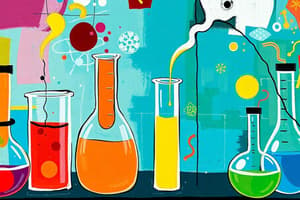Podcast
Questions and Answers
What is one key aspect of science in the early years that helps children develop their scientific skills?
What is one key aspect of science in the early years that helps children develop their scientific skills?
- Encouraging creativity
- Developing artistic skills
- Enhancing memorization
- Fostering experimentation (correct)
Why is asking questions important for young children's scientific development?
Why is asking questions important for young children's scientific development?
- To discourage critical thinking
- To decrease exploration
- To develop critical thinking skills (correct)
- To limit creativity
What does predicting outcomes allow children to do in science?
What does predicting outcomes allow children to do in science?
- Stifle creativity
- Limit observation skills
- Avoid experimentation
- Apply scientific knowledge to real-world situations (correct)
What is a key benefit of hands-on learning in early childhood education?
What is a key benefit of hands-on learning in early childhood education?
What can simple activities like growing a plant or baking help children develop?
What can simple activities like growing a plant or baking help children develop?
How can fostering experimentation in the early years impact children's future?
How can fostering experimentation in the early years impact children's future?
What is the key to developing scientific skills in children according to the text?
What is the key to developing scientific skills in children according to the text?
Why is science in the early years considered vital for a child's development?
Why is science in the early years considered vital for a child's development?
Flashcards are hidden until you start studying
Study Notes
Science in the Early Years
Science in the early years is an integral part of a child's development. It introduces children to the world around them through hands-on experiences. One key aspect of this subject is experimentation. Experimentation helps young children develop their scientific skills by observing, questioning, predicting, and refining their ideas. Here are some ways how early childhood education can foster experimentation in science:
Encouraging Observational Skills
In the early years, children begin developing their observational skills. Through activities such as nature walks and observing their surroundings, they learn to notice the world around them. This helps to build a foundation for scientific inquiry.
Asking Questions
Children are naturally curious beings. Encouraging them to ask questions about the world around them is a crucial part of their scientific development. Asking questions helps children develop their critical thinking skills and can lead to further exploration and experimentation.
Predicting Outcomes
As children begin to ask questions, they also start to make predictions about the outcomes of their experiments. Predicting outcomes allows children to apply their scientific knowledge and skills to real-world situations.
Refining Ideas
Through experimentation, children learn to refine their ideas and theories. They can test their predictions and adjust their thinking based on their observations.
Hands-on Learning
Hands-on learning is an essential part of early childhood education. Engaging children in activities that require them to get their hands dirty allows them to explore the world around them and develop their scientific skills.
Parental Involvement
Parental involvement in science education is crucial. Parents can help children develop an interest in science by engaging them in simple experiments and answering their questions.
Science at Home
Science can be incorporated into everyday life. Simple activities like growing a plant, baking, or even washing dishes can be turned into science experiments. These activities can help children develop a love for science and continue their exploration.
Promoting a Love for Science
By fostering experimentation and scientific thinking in the early years, children can develop a lifelong love for science. This can lead to further exploration and a potential career in science.
In conclusion, science in the early years is a vital part of a child's development. By encouraging experimentation through observation, questioning, predicting, and refining ideas, children can develop their scientific skills and foster a lifelong love for learning.
Studying That Suits You
Use AI to generate personalized quizzes and flashcards to suit your learning preferences.




